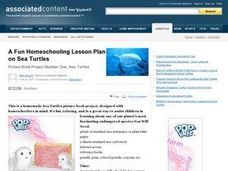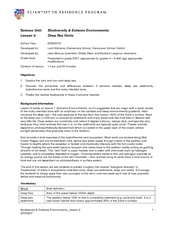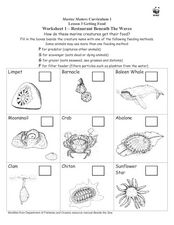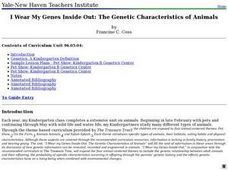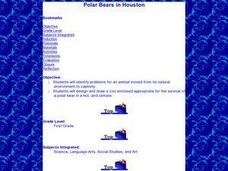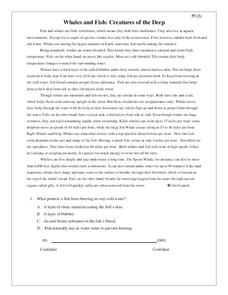Curated OER
Habitat Lap Sit
Students examine through role play interdependence of animal and man in their search for the proper arrangement of food, water, shelter and space in the same regions. Students then discuss necessary components of suitable habitat.
Curated OER
Homeschooling Lesson: Sea Turtles
Students write down the names of common turtles and observe pictures of various types. In this sea turtles lesson, students review names and features of these animals, label and draw a picture. Students research habitat, migration,...
Curated OER
Penguins Around the World
Students investigate penguins. In this Science lesson, students compare and contrast penguins to flying birds. Students use a Venn diagram to illustrate the differences and similarities of penguins and flying birds.
Curated OER
Specialized for the Sea
Students use pictures and make a mural to investigate how ocean animals are adapted to certain parts of their environment.
Curated OER
Deep Sea Vents
Students study the vent and non vent deep sea and see the differences in habitats. In this investigative lesson plan students complete a worksheet and work in groups.
Curated OER
Dependence and Interdependence
Third graders explore the dependence and interdependence that plants and animals in every environment have on one another. They examine how plants and animals depend on each other for survival. Students complete a variety of experiments...
Curated OER
Wildlife
The centerpiece of this lesson plan is a predator-prey simulation in which colored paperclips represent different species of animals camouflaged against a colored background. Relevant follow-up questions are provided. The activity is...
Curated OER
Week 8 - Sea Life
Using a magnifier, mini marine biologists examine the barbules of a bird feather. They swirl the it into a mixture of oil and water and then re-examine the feather. After the activity, discuss how the oily feathers pose a problem to...
Curated OER
Restaurant Beneath the Waves
In this marine life activity, learners fill in the boxes beside each ocean creature name with one of the following feeding methods: predator, scavenger, grazer, and filter feeder. Students then list or draw marine creatures that use the...
Curated OER
I Wear My Genes Inside Out: The Genetic Characteristics of Animals
Students create mixed breed dogs using paper illustrations of various breeds. They label dogs created by students using the Genetics Center and discuss the aspects of genetics that affect the outcome of the various projects.
Curated OER
Polar Bears in Houston
First graders read a book about animal babies from the Arctic and discuss what a polar bear needs to survive. They design a suitable zoo habitat for a polar bear using crayons and paper.
Curated OER
A Habitat Is Home
Young scholars are introduced to the concept and components of a habitat. They discuss the key components of a habitat and describe how certain factors can cause disturbances in a habitat and change its population. Activities are...
Curated OER
What Lives in Water: Pre and Post Activities
For this multiple choice worksheet, students answer questions about fish and how fish live. After visiting the aquarium, students chart the different creatures they see during their visit and solve mathematical equations of their findings.
Curated OER
Marine & Aquatic Habitats Activities - Walk in the Wetlands
Students research various types of fresh water wetlands and identify the common animal and plant life in these different ecosystems. They further analyze the need to protect these wetlands and explore their varied uses.
American Museum of Natural History
Bio-Benefits
Kick-start a discussion of the importance of biodiversity with a colorful resource that touts the benefits of maintaining healthy ecosystems. The images stress the interdependence of all the elements of an ecosystem.
American Museum of Natural History
What is Marine Biology?
A marine environment covers the majority of the earth but is arguably the least understood. Teach young scientists about the characteristics of oceans and ocean species using an interactive online lesson. The in-person or remote learning...
Curated OER
What Do Koalas Need to Survive?
First graders take a field trip and examine the Koala and his habitat. In this Koala lesson, 1st graders read Possum Magic and discuss the foods of Australia. Students view the habitat of a Koala and record what it eats, its...
Curated OER
Whales and Fish: Creatures of the Deep
Practice comparing and contrasting details in informational text with a reading passage about whales. It explains the ways that fish and whales are similar, as well as the ways they are different, and specific characteristics of various...
American Museum of Natural History
Ocean Creature Feature
From coloring to hard protective shells, ocean creatures have adaptation features that help them survive. An eight-question online quiz highlights different ocean animals and their unique characteristics. The resource then offers pop-up...
American Museum of Natural History
Mammal Flipbooks
Scholars follow eight steps to create a flipbook and discover key facts about mammals' locomotion.
Curated OER
The Great Pond Safari
Students study pond life by visiting a pond and completing an associated worksheet. They play an online game based on the pond learning experience.
Curated OER
Fish Banners
An art lesson involving fish can accent a wide variety of subjects. Here are the steps needed to create a fish banner with paint, shapes, cardboard, and paper. This would be a nice way to start or finish a unit on fish or underwater...
Curated OER
A Home for a Cricket
First graders build a habitat for crickets after studying animal survival needs. They care for and observe the crickets in the classroom habitat.
Curated OER
Adaptation and Diversity on Sheffield Island
Written for an exploration of shoreline ecosystems on Sheffield Island, this gives ecology or marine biology buffs a hands-on experience. Using GPS or visual triangulation techniques, they lay transect lines on a high and a low energy...



